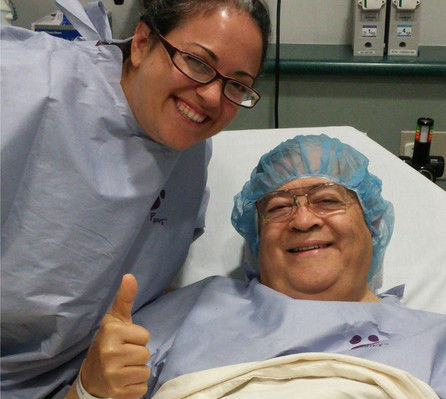
Students often forget that teachers do, in fact, have lives outside of their classrooms, and that their commitment to helping others extends beyond just their students.
Such is the case of Cynthia Faupusa, a mother of two originally from San Francisco, who is currently teaching her ninth year of English at Carlmont.
On May 29, 2015, the day of her 16th wedding anniversary, Faupusa donated her kidney to her father, Nelson Artiga, saving his life. After struggling with diabetes for 30 years and an acute kidney illness for three, Artiga suffered kidney failure at the age of 70, becoming one of the 101,189 people in America in an urgent need for a kidney transplant.
Faupusa said, “I was definitely shocked when I found out he was in kidney failure, but perhaps what was more shocking was how soon he needed the transplant.”
However, it turns out that “soon” was not so soon after all. It took six months of paperwork and a multitude of tests, ranging from several blood tests for HIV and Hepatitis, along with many other serious diseases, to x-rays and even to physiological examinations before the transplant could be approved by a committee of doctors.
“Really, the most frustrating part of the procedure was not the surgery itself but all the testing that had to be done before it to make sure everything would be alright”, said Faupusa. Later she added, “Still, I was indeed quite anxious about the actual surgery.”
The surgery for kidney transplants usually takes about two to three hours, and is achieved by a remotely non-invasive procedure known as laparoscopic donor nephrectomy.
After the surgery, Faupusa’s father immediately began recovering. Although he will be on anti-rejection medicine for the rest of his life and his diabetes is incurable, Faupusa has kept a very positive mindset, saying, “He’s doing incredibly well. He has lost weight and his diabetes has improved.”
Artiga is not the only one who had to undergo recovery. Faupusa is still dealing with the many effects of the surgery.
She said, “I’m a lot more tired these days than I used to be before the surgery. On top of that, I have to try my best to not get sick because I need to protect the one kidney I have left, which gets quite challenging when students constantly come to school sick.”
Despite the difficulties she faces, Faupusa shows up to school almost every day and still teaches all her classes, which go as late as seventh period, showing her devotion to helping those that she cares about, which is something her father definitely appreciates.
Artiga said, “I am so fortunate to have a daughter who was a match and willing to give me her kidney. Her willingness to help me, though not surprising because that is the kind of person she is, is as incredible and as it humbling.”
Still, Faupusa insists that saving her father’s life does not make her any more special then anyone else.
“I’m not a hero,” she said. “I’m just a regular person who made a selfless sacrifice in order to save her father.”
